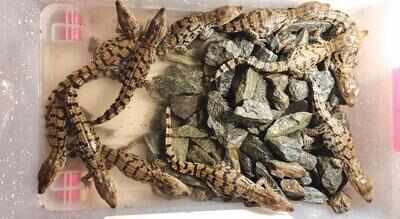Goa: After artificial hatching, 11 crocodiles released into Sal

World Crocodile Day: The artificial box nest was laid with cocopeat to help keep the eggs safe from fungus and vermin
PANAJI: Eleven two-day old baby crocodiles were released in a tributary of River Sal on Tuesday, as an attempt to incubate them in controlled conditions proved successful after a dozen eggs had been retrieved from a damaged nest.
Stray dogs or some wild animal may have dug out the nest laid by an Indian mugger crocodile. Local residents found it on May 10 and informed forest department’s South Goa mobile squad.
From recovery of the undamaged eggs by two wildlife rescuers, Julio Quadros and Benhail Antao, to the hatching process 36 days later, it was a period of eagerness and expectation for those involved in the rescue.
“We were happy to release the juveniles in the tributary close to the nest, as they may be able to unite with their mother,” Anil Shetgaonkar, deputy conservator of forest, south Goa division said.
When the two rescuers reached the site, they found the nest badly damaged. Six eggs had been eaten and even swarm of ants had invaded the shells. The duo recovered 12 out of 18 eggs—two of them slightly cracked.
The site being vulnerable, the rescuers decided relocation was inevitable. The forest department in turn entrusted the unique “baby sitting” job to Antao.
“We kept the eggs in a box with holes for ventilation and ensured suitable conditions with requisite humidity and temperature,” he said.
The artificial box nest was laid with cocopeat, which is a mixture of crushed coconut fibre and shells, to help keep the eggs safe from fungus and vermin.
The ex situ gestation period often gave rise to doubts whether enough was being done as part of incubation process. On Tuesday, a baby emerged from one of the shells. “When I first heard the cries of the first hatching, I was overjoyed. So many things could have gone wrong,” Antao said.
Out in the wild, the first baby gives a call to its mother, who takes the babies to the water. Though they are watched over by her, the juveniles are vulnerable to predator attacks.
“They are an important part of the ecosystem and help keep the riverine ecology clean,” range forest officer Prakash Naik said.
Stray dogs or some wild animal may have dug out the nest laid by an Indian mugger crocodile. Local residents found it on May 10 and informed forest department’s South Goa mobile squad.
From recovery of the undamaged eggs by two wildlife rescuers, Julio Quadros and Benhail Antao, to the hatching process 36 days later, it was a period of eagerness and expectation for those involved in the rescue.
“We were happy to release the juveniles in the tributary close to the nest, as they may be able to unite with their mother,” Anil Shetgaonkar, deputy conservator of forest, south Goa division said.
When the two rescuers reached the site, they found the nest badly damaged. Six eggs had been eaten and even swarm of ants had invaded the shells. The duo recovered 12 out of 18 eggs—two of them slightly cracked.
The site being vulnerable, the rescuers decided relocation was inevitable. The forest department in turn entrusted the unique “baby sitting” job to Antao.
“We kept the eggs in a box with holes for ventilation and ensured suitable conditions with requisite humidity and temperature,” he said.
The artificial box nest was laid with cocopeat, which is a mixture of crushed coconut fibre and shells, to help keep the eggs safe from fungus and vermin.
The ex situ gestation period often gave rise to doubts whether enough was being done as part of incubation process. On Tuesday, a baby emerged from one of the shells. “When I first heard the cries of the first hatching, I was overjoyed. So many things could have gone wrong,” Antao said.
Out in the wild, the first baby gives a call to its mother, who takes the babies to the water. Though they are watched over by her, the juveniles are vulnerable to predator attacks.
“They are an important part of the ecosystem and help keep the riverine ecology clean,” range forest officer Prakash Naik said.
FacebookTwitterLinkedinEMail
Start a Conversation
end of article
Quick Links
Delhi Air PollutionDelhi TemperatureChennai WeatherBangalore TemperatureCovid vaccination centres in DelhiCoronavirus in DelhiRTPCR test in GurgaonHyderabad RainPollution level in BangaloreDelhi SmogDelhi TemperatureNoida AQIGurgaon AQI todayFire in MumbaiMumbai RainsCovid 19 RT PCR Test in NoidaDelhi AQI todaySrinagar encounter
